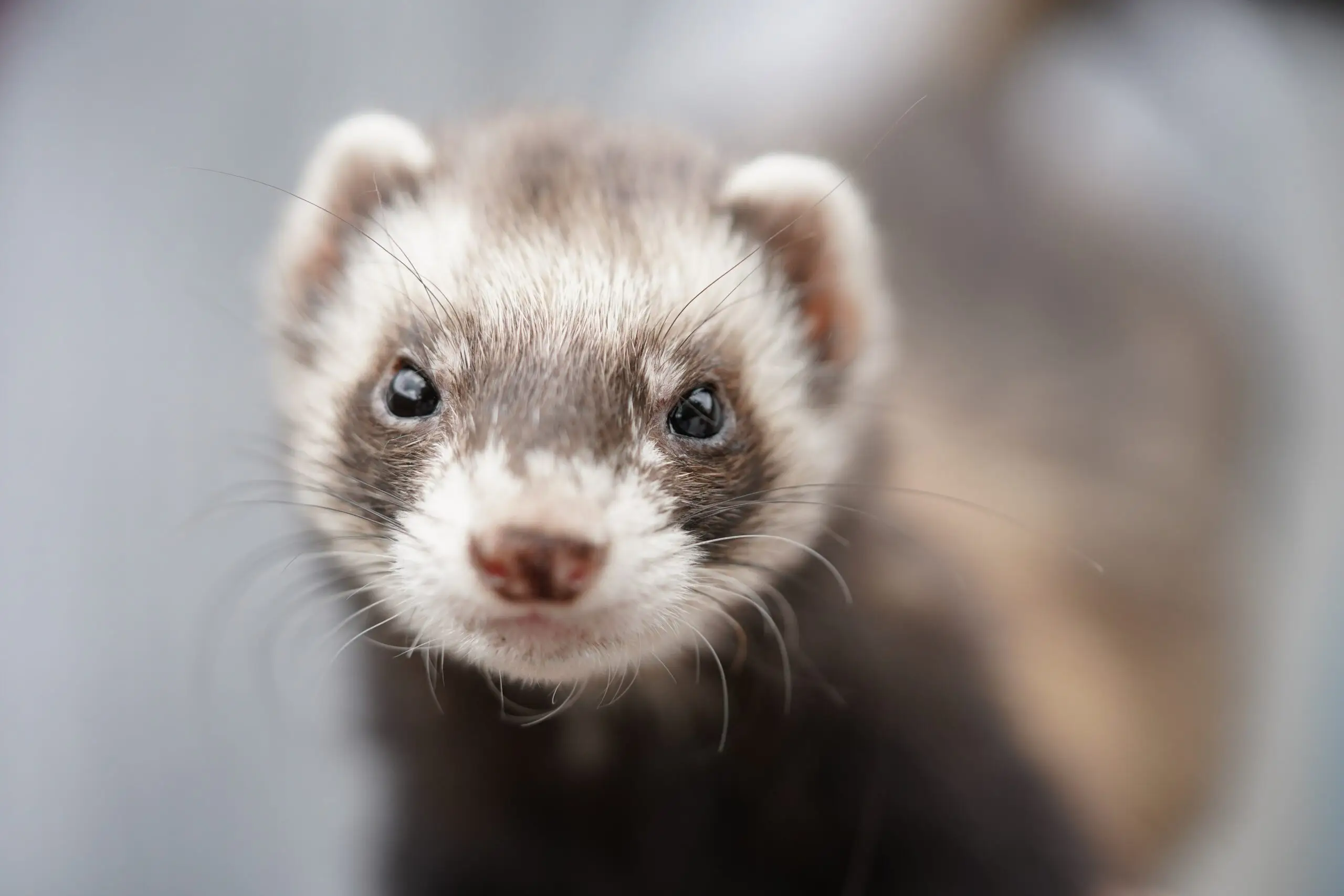Are you considering getting a ferret as a pet?
There are many subspecies of the ferret, but if you are considering getting one ferrets as pets, it is often the domesticated tamil age that is being talked about. Tamilder, or ferret as it is also called, is a popular pet. They are often described as a cross between a dog and a cat, as they are normally curious, people-friendly and can be trained to go to the toilet. Just like a puppy, ferret puppies may also need bite training. Although the ferret has been compared to dogs and cats, they are quite disobedient by nature, and also not as easy to train as dogs or as cuddly as many cats are. They also have their own body language and sound language if you are mostly used to being around dogs and cats.
The ferret belongs to the marten family, and the small predatory mammal is closely related to the mink, otters, snow mice and bobcats. Historically speaking, we have actually had ferrets as pets for thousands of years! Among other things, ferrets were used for rabbit hunting and as rat catchers by the ancient Greeks and Romans.
Are you considering getting a ferret as a pet? Let's take a closer look at what you need to think about before getting this bundle of energy as your new family member!
Table of contents
The natural behavior of the ferret
Although we have domesticated the ferret, the tame ferret has retained many of the typical behavioral traits of its wild relatives. In the wild, the ferret often lives in burrows among thickets and heather. In winter, the ferret stays in its sheltered den with surplus food it has acquired in the last months before winter. Like the cat, the ferret likes to hunt at dusk and at night. The ferret is not so picky when it comes to food, as it eats all kinds of small rodents, frogs, snails, baby birds and bird eggs. If the ferret has the opportunity, they also like to have fish on the menu. If you get a ferret, you will notice that it sleeps a lot during the day, and will be more active in the evening. Here it is important to pay attention to piles of clothes on the floor, inside tumble dryers and under sofa cushions, as ferrets tend to take a nap in these places.
As the ferret normally lives in the forest and is active in the dark, you may also notice that the ferret does not like to cross open spaces, or is particularly fond of sunlight. Ferrets are not cuddly pets, but are happy to seek you out for social play and fun.
Is it legal to have ferrets as pets in Norway?
Yes, it is allowed to have ferrets as pets in Norway, as long as you are over 16 years old. Like other pets, you must take responsibility for the ferret's well-being and good living conditions. If you are going to get hold of a ferret or ferret puppy, the most common way is to buy one via a breeder. Some pet stores also sell ferrets. It is also possible to acquire a ferret by adopting one via relocation. Ferrets live between 4 - 10 years, so if you get a slightly older ferret, they will be a bit calmer than ferret puppies as puppies and need potty training. Keep in mind that there is always a chance that the ferret may have behaviors that are difficult to change when adopting an older ferret with ingrained habits.

What do you have to think about if you are considering having ferrets as pets in Norway?
No matter which pet you consider getting, it comes with a lot of responsibility. The same applies if you are considering having a ferret as a pet in Norway. Think about whether you have the time and resources to satisfy all the needs the ferret must have to live a good life. Ferrets are cute but demanding pets. They can learn simple tricks, but you can't expect them to be trained in the same way as dogs. Think carefully about these 5 points before you get ferrets:
Do you have time to activate and give attention to the ferret daily?
Does the ferret fit into your everyday life? Ferrets as pets usually live between 4 – 10 years, but can live up to 15 years. During this life, the ferret must be socialized and activated daily. With different ferret toys, balls of yarn, doilies and pieces of cloth, ferrets should be in active play for at least four hours a day, so that it can train motor skills and release energy. It also takes a lot of time to teach the ferret to be clean and wean off biting. In addition, you must expect to spend time making your home ferret-proof. Clear away cables, move nice objects, plug up holes and openings you didn't realize you had in your home. Remember that the ferret needs care, also when you are on holiday or on business trips. Do you have someone who can look after the ferret while you are away?
Can you ferret-proof your home?
Ferrets, like dogs, should not be caged, other than for short periods. Ferrets should have a lot of time outside their cage every day, regardless of whether you consider having one or two ferrets as pets. As they are often active at night, you need to fireproof your home. Be sure you have the time and opportunity to secure your house against hazards, such as canisters, knives that stand out, cupboards, washing machines and ovens that can be opened and closed. Ferrets also come up with a lot of nonsense, such as eating things they shouldn't have. Small pieces of plastic and rubber toys can be easily eaten by the sharp teeth. Digging in flower pots is also fun for the ferret, so if you have any favorite plants, you may have to give them up, or place them out of reach. As ferrets do not have good depth vision or a good understanding of heights, you must also be aware and prevent dangerous situations where the ferret can climb up and fall down.
Do you have the opportunity to have more ferrets?
Ferrets get along well with other ferrets and thrive best when they have playmates of their own kind. (Ferrets see small rodents such as guinea pigs, rabbits and hamsters as prey, so these must not be kept together. The same applies to other small pets, such as birds and reptiles.) Somewhat depending on the ferret's personality, they can get along with other cats and dogs, but they should never be alone together until you are absolutely sure they won't hurt each other. It is strongly recommended to have at least two ferrets together if you want ferrets as pets. If not, they can become very dependent on you, which leads to problems when you don't have the opportunity to be with them. Remember that you as the owner are responsible for preventing unwanted reproduction if you have several ferrets together. Uncritical breeding can lead to genetic defects and suffering for the ferret.
Read about guinea pig, rabbit og hamster as a pet.
Are you allergic?
Every year, ferrets are relocated and euthanized due to allergies that are discovered after acquiring the pet. Take an allergy test, or visit someone who has ferrets for a few days to investigate whether you may actually have ferrets yourself. Ferrets also produce an oily secretion on the skin that smells quite strong. The smell can be reduced by neutering, but it may be a good idea to keep this in mind if you are sensitive to smells.
Expenses when you have a ferret as a pet
Have you thought about the costs involved in having a pet? We don't just think about food, toys and other equipment. Like humans, ferrets can also become ill and need professional help to recover. Are you willing to pay the veterinary costs if the ferret gets sick or has foreign objects in its stomach? In addition to pet insurance costs, ferrets should also be taken to the vet annually for health checks and necessary vaccinations. Microchipping in case the ferret goes wild and castration of ferrets is also advisable for unwanted reproduction or reduction of smell. If you are going to take the ferret on a trip, it also needs a passport and additional vaccinations, which cost money.
What does your ferret need?
Suitable sleeping places and space to frolic
Ferrets should not be kept in cages for long periods and sleep. When they sleep, they often prefer to have something around and above them. Ferret-proof your house and offer the ferret different places to sleep, such as specially made hammocks, towels or cat dens.
Docket
Like dogs, it is wise to teach the ferret to become the housekeeper. The ferret's litter box should be low and must be cleaned often to avoid odors in the house. Feel free to have several litter boxes in the house with cat litter or litter for ferrets.
Transport cage
Transport cages for veterinary visits or travel are good to have. The cage must be comfortable to lie in, preferably with a hammock, travel kit and access to food and water. Give raw and cooked meat, fish or raw egg yolks as supplementary food. Ferrets should not have dairy products, sweets, salty food or bread.
Food and water
Ferrets are carnivores and need animal proteins and fats. Ferrets eat often, and should always have access to food and fresh water. Ferrets eat dry food and wet food intended for the species, but can also eat dry food for kittens that contains between 32 - 38% animal proteins.
Imagine
Ferrets are good at grooming their fur, but during shedding periods, you can help them avoid hairballs in their guts. For example, use a cat brush. Ferrets as pets also need help with their claws so that their claws do not reach the floor when they stand on all fours.
Do you need equipment and accessories for ferrets? Take a look at our online pet shop!
Common health problems for ferrets as pets
A healthy ferret is active, grooms itself often and has a good appetite. The ferret's coat should be smooth and shiny, and the hind end should be clean, with no signs of soreness. Healthy ferret eyes should be clear, clean and glossy, and the muzzle should be soft and slightly moist. The ferret's gums are healthy when the color is pale pink without inflammation.
Once you know your ferret, it will be easier to notice if it changes behavior due to discomfort or illness. There are some diseases and disorders in ferrets that are more common than others. For example, ear mites in the ear canals, tumors in the adrenal glands and pancreas, constipation and diarrhoea. If you have a female ferret, they can also suffer from prolonged heat if they are not mated.
Contact your veterinarian if you suspect something is wrong with your pet. If you live in Larvik, you can easily book an appointment in our small animal clinic here. Get in touch on +4733139840 or post@a-vet.no if you have questions.
For urgent inquiries outside our opening hours, we recommend contacting the nearest 24-hour veterinary clinic.
Elisabeth is a veterinarian and authorized ophthalmologist with specialization in eye surgery, as well as further training in internal medicine, general surgery, oral surgery and ultrasound from the European School for Advanced Veterinary Studies in Toulouse.
-
Elisabeth Bjørnestadhttps://www.a-vet.no/author/elisabeth_bjornestad/
-
Elisabeth Bjørnestadhttps://www.a-vet.no/author/elisabeth_bjornestad/
-
Elisabeth Bjørnestadhttps://www.a-vet.no/author/elisabeth_bjornestad/
-
Elisabeth Bjørnestadhttps://www.a-vet.no/author/elisabeth_bjornestad/


